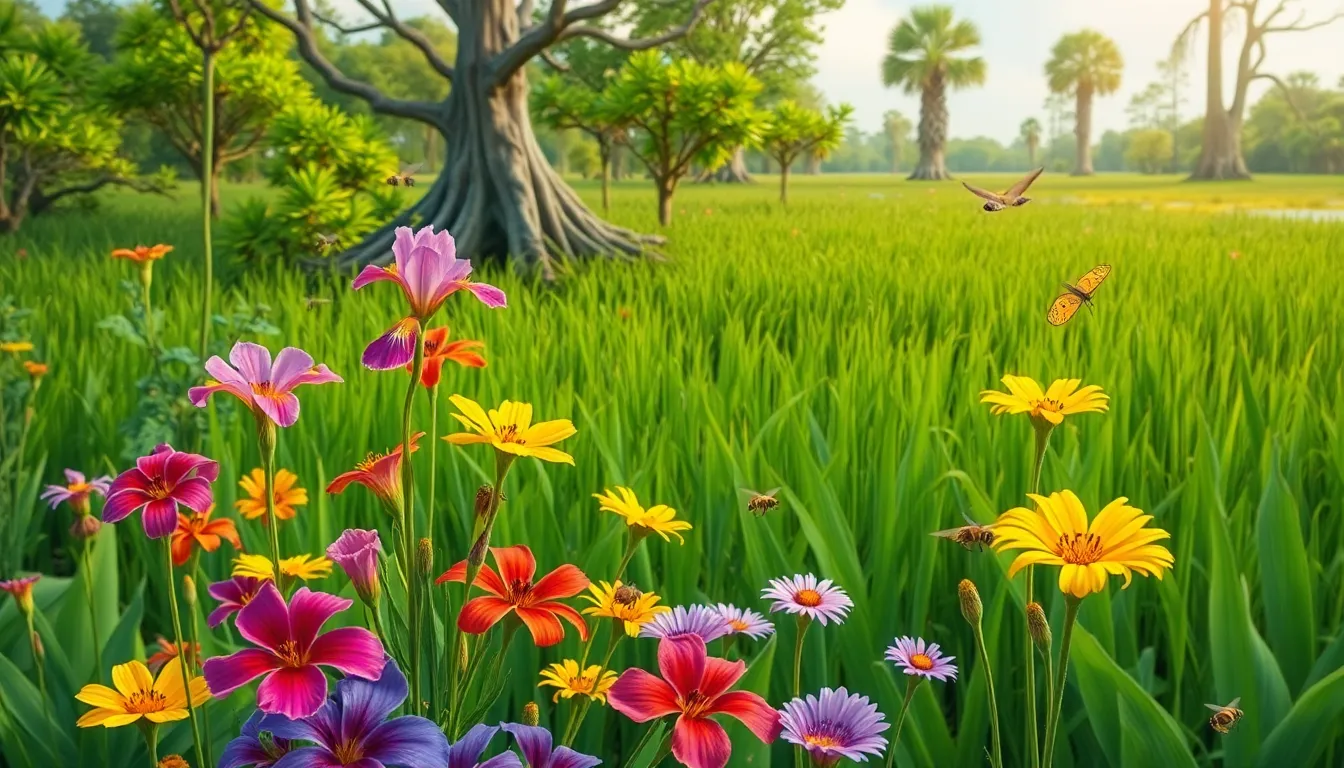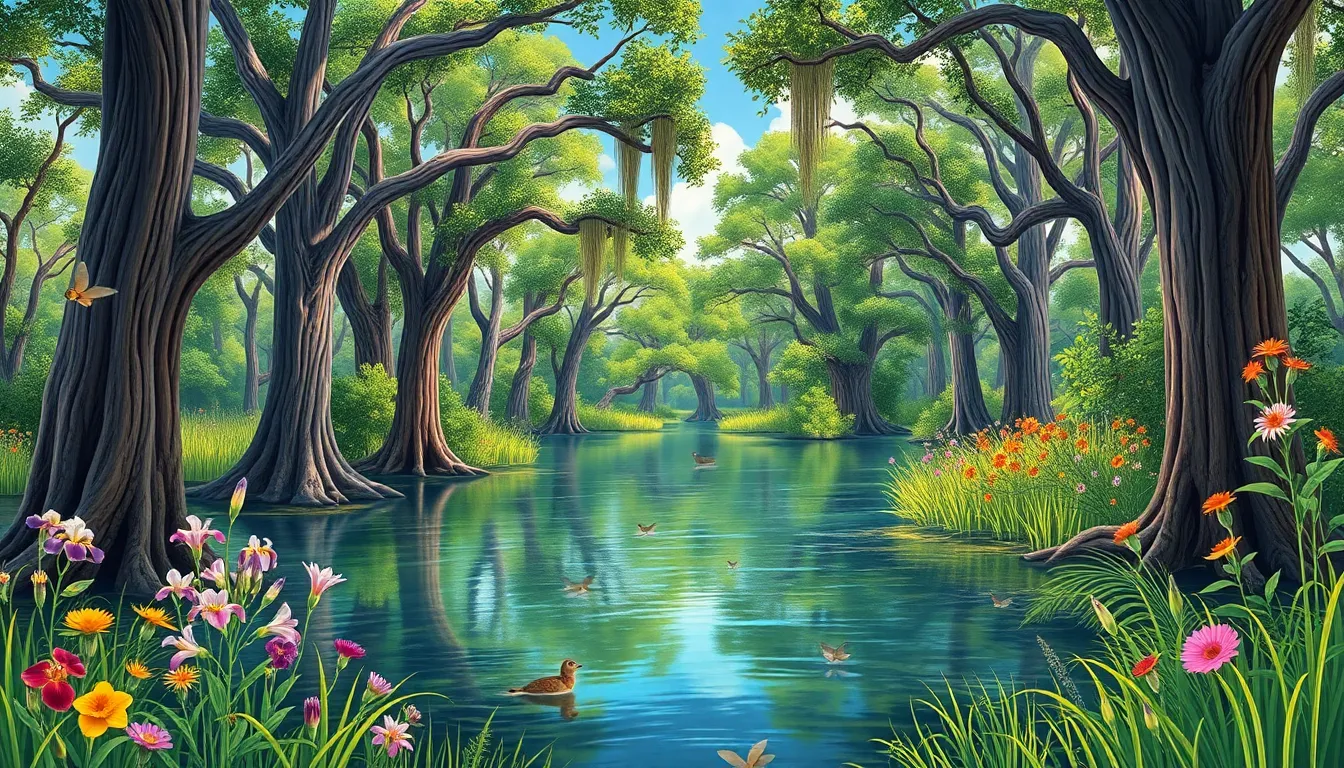In the heart of the bayou, Louisiana boasts a treasure trove of native plants that are as vibrant as the culture itself. From the majestic cypress trees that seem to whisper secrets of the swamp to the colorful wildflowers that dance in the breeze, these plants are not just pretty faces; they play a crucial role in maintaining the ecosystem’s balance.
Louisiana Native Plants
Louisiana boasts an array of native plants that thrive in its unique ecological landscapes. These plants play crucial roles in their habitats, offering food and shelter for various wildlife species. Among them, cypress trees stand tall, their strong roots stabilizing wetlands and improving water quality.
Wildflowers such as the Louisiana iris and the trumpet creeper bring vibrant colors to the scenery. These species not only enhance beauty but also attract pollinators like bees and butterflies, contributing to the biodiversity essential for ecosystem health.
Local grasses like little bluestem and swamp grass provide essential coverage for soil, preventing erosion and supporting a myriad of wildlife. Shrubs such as buttonbush and elderberry serve multiple purposes, offering food for birds and insects while enhancing the visual appeal of natural landscapes.
Planting native species helps maintain the integrity of the local environment. Native plants require less maintenance, as they are adapted to local climate and soil conditions. Utilizing these plants in landscaping reduces the need for fertilizers and pesticides, promoting a healthier ecosystem.
Overall, integrating Louisiana native plants into gardens and public spaces fosters resilience in local ecosystems. This not only supports wildlife but also preserves cultural heritage associated with native flora. Engaging with local conservation groups can further enhance efforts to protect and promote these vital plants.
Importance of Louisiana Native Plants

Louisiana native plants play a vital role in maintaining healthy ecosystems and supporting local economies. Their significance extends beyond aesthetics, contributing to environmental stability and economic growth.
Ecological Benefits
Native plants foster diverse ecosystems by providing food and habitat for local wildlife. Pollinators, such as bees and butterflies, thrive in areas with abundant native flowers like Louisiana iris and trumpet creeper. Aquatic plants, including cypress trees, enhance wetland stability while improving water quality. Deep-rooted grasses prevent soil erosion, ensuring the integrity of riverbanks and shorelines. By attracting beneficial insects, native plants support natural pest control. These ecological benefits ensure that ecosystems remain balanced and resilient.
Economic Benefits
Local economies benefit significantly from native plants through tourism and landscaping. Eco-tourism thrives in areas rich in native flora, attracting visitors interested in experiencing Louisiana’s unique biodiversity. Landscapers and gardeners favor native plants for their low maintenance requirements, reducing long-term costs. Nurseries specializing in native species often experience increased demand, leading to job creation. Additionally, conservation efforts focused on native plants enhance property values, making them financially advantageous for homeowners. Investing in native landscaping contributes to a sustainable economy that prioritizes environmental health.
Types of Louisiana Native Plants
Louisiana’s native plants encompass a variety of species, essential for the local ecosystem’s health and beauty. These plants, including trees, shrubs, wildflowers, and grasses, thrive in the state’s unique environments.
Trees and Shrubs
Cypress trees dominate the wetlands, providing vital habitat for numerous wildlife species. These majestic trees stabilize soil and improve water quality. Buttonbush offers food for pollinators and birds, enhancing local biodiversity. Elderberry bushes attract various pollinators while supplying nutritious berries for birds and mammals. Additionally, the long-lived live oak provides shade and habitat, making it a desirable choice for landscapes.
Wildflowers and Grasses
Wildflowers like the Louisiana iris and trumpet creeper attract essential pollinators, vital for the region’s ecology. These vibrant wildflowers bloom throughout different seasons, enriching the landscape. Native grasses, such as switchgrass and big bluestem, prevent soil erosion and support various creatures. They thrive in Louisiana’s diverse habitats, contributing to the overall stability of the ecosystem. These plants enhance the beauty of gardens and natural areas while fulfilling essential ecological roles.
Cultivating Louisiana Native Plants
Cultivating Louisiana native plants creates a thriving and ecologically diverse garden. Native species adapt well to local conditions, requiring minimal intervention.
Planting Tips
Select appropriate native plants that match your garden’s specific conditions such as sun exposure and soil type. Timing is crucial, so transplant during the cooler months of fall or spring. Prepare the soil by loosening it and removing weeds, ensuring proper drainage. Space plants adequately to allow for growth, typically 1 to 3 feet apart. Incorporating mulch helps retain moisture and suppress weeds. Understanding local wildlife also influences plant choices; certain species attract beneficial pollinators and birds, enhancing biodiversity.
Maintenance and Care
Monitoring your native plants regularly prevents any disease or pest issues. Watering during dry spells is essential, though established plants require less frequent watering. Encouraging natural pest control through beneficial insects reduces the need for chemical interventions. Pruning promotes healthy growth and flowering, especially for shrubs and perennial plants. Reapplying mulch each season maintains soil health and moisture retention. Recognizing that native plants flourish with minimal care reinforces their benefits for gardeners and the ecosystem.
Conclusion
Embracing Louisiana native plants not only enhances the beauty of gardens but also strengthens local ecosystems. These plants offer essential benefits like habitat for wildlife and improved soil health. By choosing native species, gardeners can create vibrant landscapes that require less maintenance and contribute to environmental resilience.
Investing in native landscaping supports both ecological integrity and local economies. As communities recognize the importance of these plants, they foster a deeper connection to Louisiana’s rich natural heritage. With the right knowledge and practices, anyone can cultivate a thriving garden that celebrates the unique flora of this remarkable state.

